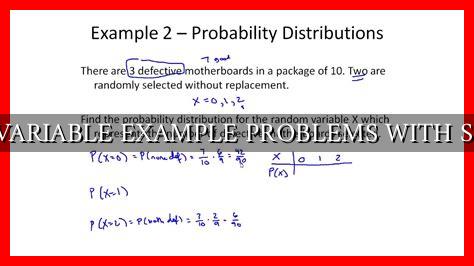-
Table of Contents
RANDOM VARIABLE EXAMPLE PROBLEMS WITH SOLUTIONS
Random variables are a fundamental concept in probability theory and statistics. They represent numerical outcomes of random events and can take on different values with certain probabilities. Understanding random variables is crucial for analyzing and interpreting data in various fields such as finance, engineering, and biology. In this article, we will explore random variable example problems with solutions to help you grasp this important concept.
Definition of Random Variables
A random variable is a variable whose possible values are outcomes of a random phenomenon. It can be discrete, taking on a finite or countably infinite number of values, or continuous, taking on any value within a certain range.
. Random variables are typically denoted by uppercase letters such as X, Y, or Z.
Example Problems
Problem 1: Rolling a Fair Die
Consider rolling a fair six-sided die. Let X be the random variable representing the outcome of the roll. Find the probability distribution of X.
- X can take on values {1, 2, 3, 4, 5, 6} with equal probabilities.
- The probability distribution of X is P(X = 1) = P(X = 2) = P(X = 3) = P(X = 4) = P(X = 5) = P(X = 6) = 1/6.
Problem 2: Tossing a Biased Coin
Suppose you have a biased coin that lands on heads with probability 0.7 and tails with probability 0.3. Let Y be the random variable representing the outcome of a single toss. Determine the probability distribution of Y.
- Y can take on values {H, T} with probabilities P(Y = H) = 0.7 and P(Y = T) = 0.3.
Solutions
Problem 1 Solution:
To find the probability distribution of X for rolling a fair die, we simply divide the total number of outcomes by the number of possible values:
- P(X = 1) = P(X = 2) = P(X = 3) = P(X = 4) = P(X = 5) = P(X = 6) = 1/6.
Problem 2 Solution:
For the biased coin toss, we have:
- P(Y = H) = 0.7
- P(Y = T) = 0.3
Conclusion
Random variables play a crucial role in probability theory and statistics, allowing us to model and analyze uncertain events. By understanding random variable example problems with solutions, you can enhance your ability to interpret data and make informed decisions. Practice solving various random variable problems to strengthen your grasp of this important concept.
For more information on random variables and probability theory, you can refer to this Khan Academy resource.





